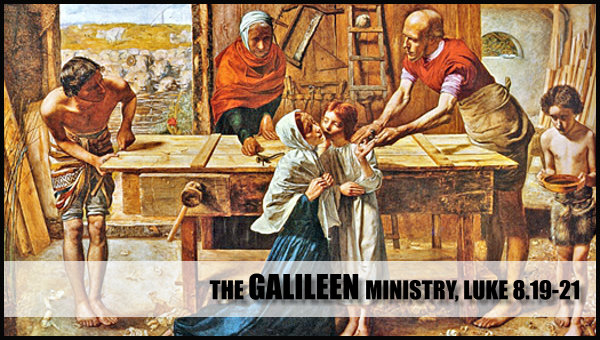By Tyson Thorne

The Galilean Ministry at Various Cities (4.14-9.50), 8.19-21
While teaching at an unknown location Mary and some of Jesus’ brothers came to see Jesus. They had difficulty getting through the masses so they sent word of their presence through the crowd. When word reaches Jesus that his family is waiting to see him, he responds in a way many consider cavalier and unkind. “My mother and my brothers,” he replied, “are those who hear the word of God and do it.” Since the gospel writers never tell us what happens after, it appears that perhaps he completely ignored his mother and brother. Does this sound like something Jesus would do?
Would Jesus disrespect his family? Based on what we have seen of Jesus up to this point, we can say with assurance that such behavior would be uncharacteristic. Not having the entire story we can only conjecture, but it is my belief that as word comes to Jesus about his family visit he turns it into a teaching moment. What he teaches, in point of fact, expands the notion of family rather than diminish it. Listen to his words again:
But he replied to them, “My mother and my brothers are those who hear the word of God and do it.”
Jesus is including the devout follower in his family. You and I and everyone who lives in obedience to God’s word become a part of the family of Jesus! Now this may not sound like a new idea for we’ve used the phrase “family of God” in church services for centuries. Even so, the reality of this concept is far from trite. Imagine yourself in John’s place at the crucifixion, as Jesus looks down from the cross and says, “This is your mother” and to Mary, “This now is your son.” You are part of the family of God.
This is not the only repercussion of Jesus’ words, however. In this single sentence Jesus has shaken the very foundations of Judaism. He has just stated that the family of God is not a birthright or a blood tie (being an Israelite), but any – all – who hear and obey the Word of God. You are probably familiar with the phrase “blood is thicker than water”, but I like to add “and the Spirit is thicker than both!” Meaning that our relationship with God, being a brother or sister of Jesus, is greater even than our relationship with our physical siblings. This is the teaching behind Luke 14.25 as well, which we examine in detail when we get there. Therefore, the special relationship the Hebrews enjoyed with God (and kept to themselves) for several millennia was suddenly opened to anyone. How dare we take this for granted.
Luke uses this account to end Jesus’ teaching on hearing and doing that he began with the parable of The Sower. This is a lesson Jesus’ brother James must have learned well, for it is the basis of his letter to the Christians dispersed among the Roman empire due to persecution. Many have misunderstood the argument James makes – Martin Luther wanted it removed from the Bible altogether – and it is an easy mistake to make unless one understands it in light of Jesus’ teachings here. We are saved by grace alone, and yet the one who is saved will bear the fruit of obedience. Without obedience one is like the shallow soil whose fruit finds no depth and burns up in the midday sun.
The question the reader would naturally ask at this point is “why?” Why should I obey the teachings of Jesus? If the miracles he has performed already were not reason enough, Luke is about to embark on three more events in the life of Jesus that prove his authority over all things, beginning with the natural world. But that is a lesson for next time.
|
|
